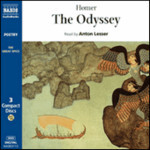
The Odyssey (abridged and translated by William Cowper) (Read by Anton Lesser)
 $43.00
Out of Stock
$43.00
Out of Stock6+ weeks add to cart
The Odyssey (abridged and translated by William Cowper) (Read by Anton Lesser)
HOMER
[ Naxos Audiobooks / 3 CD Box Set ]
Release Date: Thursday 1 March 2007
This item is currently out of stock. It may take 6 or more weeks to obtain from when you place your order as this is a specialist product.
The Odyssey is one of the two great epics of ancient Greece, the other being, of course, The Iliad. Of their author, Homer, we know almost nothing: he probably lived in the 8th century BC and it is almost certain that he composed his verse orally, its literary form not being settled until the 6th century BC.
Music by Debussy.
The Odyssey is one of the two great epics of ancient Greece, the other being, of course, The Iliad. Of their author, Homer, we know almost nothing: he probably lived in the 8th century BC and it is almost certain that he composed his verse orally, its literary form not being settled until the 6th century BC. By this time, Homer's works had come to represent something like the Bible in the Judaic-Christian tradition: they formed the artistic, moral and narrative basis of ancient Greek (and then Roman) culture. The two epics survived the Dark and Middle Ages, although they only became widely known again in the Renaissance period. Since then, they have been repeatedly translated.
The Odyssey tells the story of the wanderings and eventual homecoming of Odysseus, King of Ithaca, after the end of the Trojan War in which he had played such a conspicuous role - devising and carrying out, for instance, the winning stratagem of the Wooden Horse. The story is given in a cleverly varied form - partly consisting of flashbacks told by Odysseus himself and partly straight third-person narration: Odysseus' adventures are interwoven with the fortunes of his wife Penelope (at home in Ithaca) and his son Telemachus (who sets off to find Odysseus just as Odysseus is about to return).
Throughout, human endeavor is mingled with divine intervention - for example, Odysseus enjoys the special favor of Pallas Athena, but must also contend with the wrath of Poseidon. Before he is able to reach his native shore, Odysseus is drawn into affairs with goddesses (Calypso and Circe); must outwit monsters like the Cyclops Polyphemus, and successfully evade the allure of the Sirens or the Lotus Eaters.
The second half of the story concerns the way in which Odysseus, disguised, retakes his own kingdom from the greedy suitors who beset Penelope: in this task, he is helped by Telemachus and two faithful retainers.
What is the enduring appeal of The Odyssey? First, there is the character of Odysseus himself. He is an interestingly complex figure in that he is widely admired by his contemporaries, brave and resourceful; yet he is also wily, self-seeking and capable of superbly inventive falsehood when the occasion requires. He is, above all, a survivor: he endures twenty years' absence from home, and returns triumphantly to reclaim wife and kingdom - yet, as Tiresias foretold, he will not settle down but will once more set forth 'to seek a newer world…to sail beyond the sunset' (as Tennyson romantically expresses it). Odysseus, then, is the archetypal wanderer who speaks to that part of each of us that yearns for escape into the unknown.
The poem itself, of course, is the original adventure story, with its wide range of character, incident and setting, but its structure is cleverly controlled and its language haunting in its loving stress on the fresh, the beautiful and the awe-inspiring. Homer writes as one who looks at the world with a fresh wonder, where every dawn is rosy-fingered in its promise of new places and new exploits.
But The Odyssey is also full of sharp psychological insight - for instance, Homer's depiction of Penelope's pitiful devices for putting off the suitors; and touches of telling pathos - Odysseus, disguised, is first recognized in his palace by his faithful dog Argus, who is only able to wag his tail, unable to rise, and dies 'as soon as he had lived to see Odysseus in the twentieth year restored.'
Homer wrote in hexameters, while Cowper uses blank verse (unrhymed ambic pentameter) for his version. Translations of Homer by Dryden, Pope and others had been made throughout the Augustan period, generally using the rhymed couplet; but Cowper's version seems to me to combine almost ideally the dignified music of Milton with the classical restraint and formality of 8th century verse. In addition, there is a hint of the 19th century at a time when Wordsworth and Coleridge were already active.



